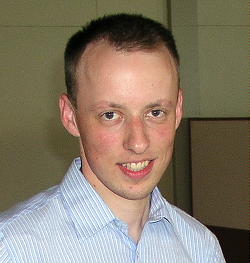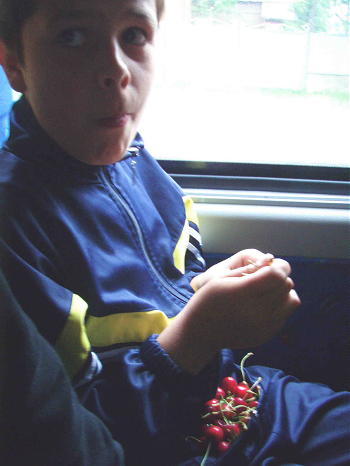Nice To Meet You!
Impressions of My LifeNets Mission to Vinogradov, Ukraine in June 2008
by Stefan Saxin
Vinogradov Home Page
Summer 2008 menu
LifeNets Home
August 17, 2008
During the two last weeks of June 2008 a team of four people traveling from the U.S., France and Sweden came to Western Ukraine in order to start up an English program for children.
About 35 children came for summer camp at the Light of Love Mission – a LifeNets-sponsored project in Vinogradov.
|
|
|
Other reports |
We arrived on Sunday, June 15th, and were greeted outside the entrance of the Chop train station by many of the children accompanied by adults that had come the lengthy way to Chop (near the border to Hungary) to pick us up.
On the way to our destination we made a stop and a box of ripe cherries was purchased – it was a much appreciated treat for the many passengers. Unlike Western Europe it is perfectly normal to buy and sell food by the roadside. (Throughout the stay the local farmer’s produce seemed to hold very high quality.)
We resumed our journey to Vinogradov. There were of course some language difficulties but I was surprised how quickly we struck up simple conversation. From where I sat in the back (without translator) we could introduce ourselves with name and age.
Among my first impressions of the landscape was to see the mountains, the Carpathians embedded in the green rural landscape. They’re vast and widespread mountains covered by trees that dominate this part of Ukraine (the rest of the country is flat).
As we came closer I
began to notice the many vineyards. Apparently, people even grow grapes
around their natural gas pipes that here run above ground level. This is
truly a grape- and wine district – it’s even heard in the name
“Vinogradov”.
At last we arrived at the centre – being welcomed by additional people who we talked with via translator.
After a little while we proceeded to have our first Ukrainian supper. The dining room at the centre is a light and spacious room with several large tables. Through the windows you can see out to the street, and in the next room is a well-equipped kitchen. Before every meal a prayer of thanksgiving is said, usually by one of the children.
For our first meal there was soup and bread as starter, a main course and a dessert. Needless to say, we ate very good food (and much of it!) throughout our stay – Ukrainians are known for their hospitality and they show special care when it comes to food.
The first days of our stay were rainy and humidity was therefore high. We began our first class on Monday morning and continued every week day for two weeks. The curriculum was based on the Genki English program where the main idea is to do the corresponding movements while singing the new words. We complemented the Genki program with ideas of our own, such as individual glossary books and providing a key at the end of the camp with the most important words and phrases.
One estimate says that 120 000 children are abandoned[1] in Ukraine, often economic factors play a central role – the collapse of the Soviet Union meant serious economic problems in the 90’s with hyperinflation and high unemployment as consequences, leading to other social problems which affect the children.
Most of the children at the Light of Love Mission are street children with different hardships behind them. At the centre in Vinogradov they are fed several times every day - not only during summer camp but all year round. Apart from the delicious meals the children receive they are also educated in Christian values and the Bible. Vasyl and Irina Polichko, the couple who run the mission, recognize the many needs the children have and aim to prepare them adequately for adulthood.
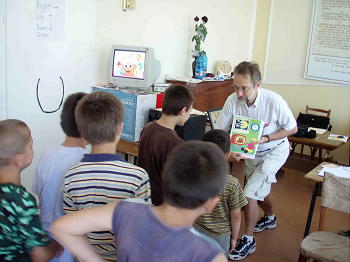
Ken leads a
game: the first one to say it correctly |
The children are truly loved by the adults at the centre who are good family role-models; for some of the children, this is the closest to a real functioning family they’ll have. If you’re a street child in Vinogradov it does bring security and comfort to know that there is a home where you are always welcome.
Since the centre is primarily a place for kids there is often a lot of games or sports going on. The children have a lot of energy and like to play a lot – not much time for indoor computer games here! Indeed, I was gladly surprised to find that the kids were not only physically active but also well mannered and friendly. Many of them are above their Western counterparts in social skills and manners.
For afternoon activity we usually took the LifeNets van and a red minibus and went on excursions. We saw e.g. peacocks and ostriches at a farm and walked the famous ruins in Vinogradov. As the weather grew hotter we walked several times to a nearby place to where we stayed and took a swim. At all the excursions there was a snack and something to drink, the same went for the days when we stayed at the centre to play games – we never had a chance of becoming faint or hungry!
Major differences from Western society that we noticed were e.g. that the children are more permitted to go to places without an adult always present. It is perfectly normal in their society that children play without adult supervision. It resembles the freedom older generations in the West had when they were children. We were told that criminality is higher in the cities like Kyiv and Odessa, so here people felt safer. For additional impressions of my Ukraine trip, see my web commentary for Vertical Thought
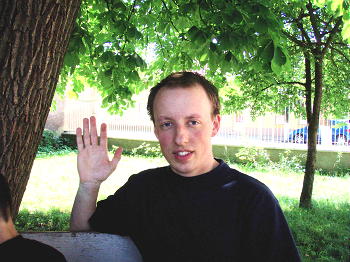 Stefan at the Centre. |
What came as a little surprise to me was to discover that the area we had visited, Transcarpathia, has been officially mapped as the geographical centre of Europe. There is a monument somewhere in Transcarpathia, near the Slovak border, put there in 1911 by the Vienna Geographical Society, and which in Latin states: “… with a scale of meridians and parallels, the center of Europe has been established here.”
Even though it is the geographical centre of Europe there is not much English to be found. Indeed, the languages spoken here are mainly Ukrainian, Transcarpathian (the local dialect) and Russian. Therefore we all thought it a good idea to teach the children some basic English.
After nearly two weeks we did see progress with all the children as they performed the songs that they had learned in front of the interested adults. Following that we then sat back and enjoyed to see the children and also local talents perform Ukrainian songs. After the music there was food, desserts and candy – a great ending to the summer camp!
It is our hope that they will continue to build on their English vocabulary (hence the glossary books) so that they can easier absorb the English they’re been taught in ordinary school. To encourage them keeping their glossary books we attached a photograph of the Summer English class of 2008 and gave to each of the children. They were very pleased with this and gladly surprised at the end of the two weeks as they received it together with a small gift.
 A game of chess at the centre amongst all the activity. |
“Thank you” they replied.
All in all, the English summer program was successful. It’s fair to say that all the children learned some English, some more than others. It is further worth emphasizing that they were on a bit different levels from the start since they attend different schools.
However, I suspect that it may be like with my own learning of Ukrainian: it was first when I had been immersed in the language that the learning really took off. We did much the same with the kids – one hour every day they were immersed in it through song, dialogue and games (and of course when they themselves thought of using their acquired English skills at e.g. the dinner table or when we talked to them).
In Vinogradov we saw a lot of building and construction work going on. The economic situation seemed at first blush to be improving – my Swedish bank had its local office there (which is a sure sign of economical activity) as well as other banks. According to the World Bank homepage the average wage in Ukraine was US$ 206 per month in 2006, but the annual increase for wages is about 40% per year (making an average wage of 400-500 US$ per month plausible today).
The economic growth was 7.3% per year in 2007 (GDP), but recall the country was very much set back after the fall of the Soviet Union. With the recent food crisis prices on food have increased by 40% in February 2008 compared to the year before. Overall inflation (CPI) is about 25%, which is very high. At one bakery we could buy three fresh loaves of bread for about 1 US$ altogether, so it was cheap for us but obviously more costly for the locals.
Hopefully the English program we started will help some of the children in their future job situation – provided they can continue to learn. Since knowledge of English is poor in the country, and Ukraine is under constant development, they could build on their acquired knowledge and perhaps find a job where English is an important part of the key to their future.
Hopefully though, everyone has already benefited from learning English this summer – they now know for example how to introduce themselves, ask how you are and eloquently round off with a “Nice to meet you!”
And we soon noticed that the children began to transfer parts of their newly gained knowledge to parents and others, which was a welcome surprise.
LifeNets not only helps people to help themselves – the recipients help others in turn!
[1] Anna Shevchenko, “Ukraine - Culture Smart!: a quick guide to customs and etiquette”, (2006) p 41
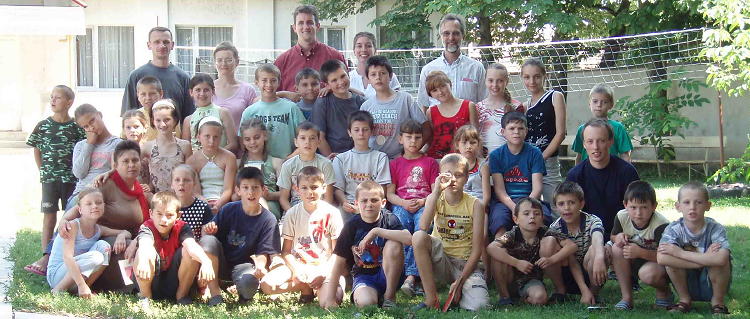
The photograph in everyone’s
glossary book
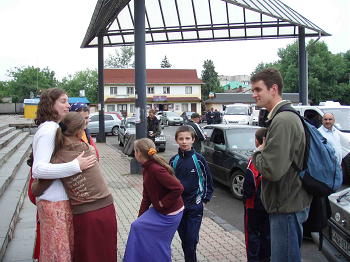 We were greeted by the children outside the Chop train station.
In the back of the LifeNets van, other angle.
Arrived at the centre in Vinogradov.
Busy with glossary books. “Copy the writing from the wall.”
Carpathian mountains covered in mist.
The last evening was a bit special…
Tasty Ukrainian food, enjoyed outside.
A nice surprise inside.
|
 On our way to Vinogradov – photo op.
Cherries were a great hit!
Oh, more cherries!
From another excursion, had just arrived. We ended up playing dodge-ball.
Vineyards – a sight quite common here.
Near the rural house where we stayed. In the field people are busy doing the hay.
|
